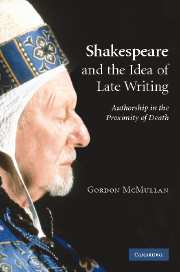24 results
Chapter 6 - The Shakespeare’s Globe/King’s College London MA Shakespeare Studies
- from Part II - Reimagining Shakespeare with/in Universities
-
-
- Book:
- Reimagining Shakespeare Education
- Published online:
- 02 February 2023
- Print publication:
- 23 February 2023, pp 102-112
-
- Chapter
- Export citation
Cardiac and vascular health in late preterm infants
-
- Journal:
- Journal of Developmental Origins of Health and Disease / Volume 13 / Issue 1 / February 2022
- Published online by Cambridge University Press:
- 19 March 2021, pp. 128-134
-
- Article
- Export citation
Remembering and Forgetting in 1916: Israel Gollancz, the Shakespeare Tercentenary and the National Theatre
-
-
- Book:
- Shakespeare Survey 70
- Published online:
- 30 November 2017
- Print publication:
- 07 December 2017, pp 40-49
-
- Chapter
- Export citation
Impact of a Central Line Infection Prevention Bundle in Newborn Infants
-
- Journal:
- Infection Control & Hospital Epidemiology / Volume 37 / Issue 9 / September 2016
- Published online by Cambridge University Press:
- 13 June 2016, pp. 1029-1036
- Print publication:
- September 2016
-
- Article
-
- You have access
- HTML
- Export citation
9 - Goblin’s market: commemoration, anti-semitism and the invention of ‘global Shakespeare’ in 1916
-
-
- Book:
- Celebrating Shakespeare
- Published online:
- 05 November 2015
- Print publication:
- 19 November 2015, pp 182-201
-
- Chapter
- Export citation
Afterword
-
-
- Book:
- Late Shakespeare, 1608–1613
- Published online:
- 05 December 2012
- Print publication:
- 08 November 2012, pp 262-267
-
- Chapter
- Export citation
Contributors
-
-
- Book:
- Late Shakespeare, 1608–1613
- Published online:
- 05 December 2012
- Print publication:
- 08 November 2012, pp viii-viii
-
- Chapter
- Export citation
17 - The Changeling and the dynamics of ugliness
- from Part II - Readings
-
-
- Book:
- The Cambridge Companion to English Renaissance Tragedy
- Published online:
- 28 November 2010
- Print publication:
- 12 August 2010, pp 222-235
-
- Chapter
- Export citation
Jennifer Summit. Memory's Library: Medieval Books in Early Modern England. Chicago: University of Chicago Press, 2008. Pp. x+343. $35.00 (cloth).
-
- Journal:
- Journal of British Studies / Volume 49 / Issue 1 / January 2010
- Published online by Cambridge University Press:
- 21 December 2012, pp. 148-150
- Print publication:
- January 2010
-
- Article
- Export citation
1 - What is a ‘late play’?
-
-
- Book:
- The Cambridge Companion to Shakespeare's Last Plays
- Published online:
- 28 May 2010
- Print publication:
- 16 July 2009, pp 5-28
-
- Chapter
- Export citation
Frontmatter
-
- Book:
- Shakespeare and the Idea of Late Writing
- Published online:
- 22 September 2009
- Print publication:
- 06 December 2007, pp i-vi
-
- Chapter
- Export citation
2 - The Shakespearean caesura: genre, chronology, style
-
- Book:
- Shakespeare and the Idea of Late Writing
- Published online:
- 22 September 2009
- Print publication:
- 06 December 2007, pp 65-126
-
- Chapter
- Export citation
Introduction
-
- Book:
- Shakespeare and the Idea of Late Writing
- Published online:
- 22 September 2009
- Print publication:
- 06 December 2007, pp 1-23
-
- Chapter
- Export citation
Index
-
- Book:
- Shakespeare and the Idea of Late Writing
- Published online:
- 22 September 2009
- Print publication:
- 06 December 2007, pp 394-402
-
- Chapter
- Export citation

Shakespeare and the Idea of Late Writing
- Authorship in the Proximity of Death
-
- Published online:
- 22 September 2009
- Print publication:
- 06 December 2007
6 - The Tempest and the uses of late Shakespeare in the theatre: Gielgud, Rylance, Prospero
-
- Book:
- Shakespeare and the Idea of Late Writing
- Published online:
- 22 September 2009
- Print publication:
- 06 December 2007, pp 318-353
-
- Chapter
- Export citation
Acknowledgements
-
- Book:
- Shakespeare and the Idea of Late Writing
- Published online:
- 22 September 2009
- Print publication:
- 06 December 2007, pp ix-xii
-
- Chapter
- Export citation
3 - The invention of late Shakespeare: subjectivism and its discontents
-
- Book:
- Shakespeare and the Idea of Late Writing
- Published online:
- 22 September 2009
- Print publication:
- 06 December 2007, pp 127-189
-
- Chapter
- Export citation
Contents
-
- Book:
- Shakespeare and the Idea of Late Writing
- Published online:
- 22 September 2009
- Print publication:
- 06 December 2007, pp vii-viii
-
- Chapter
- Export citation
4 - Last words/late plays: the possibility and impossibility of late Shakespeare in early modern culture and theatre
-
- Book:
- Shakespeare and the Idea of Late Writing
- Published online:
- 22 September 2009
- Print publication:
- 06 December 2007, pp 190-258
-
- Chapter
- Export citation



